If you’re a digital content creator, you’re most likely familiar with the term “copyright”. But what does copyright mean, and how does it affect digital content creators?
You’d be surprised to learn that 29% of the internet’s content is plagiarized. Not all of it is done intentionally though of course. Sometimes people may end up using your content by accident without even knowing it.
So, how do you avoid that? With something called a copyright disclaimer.
In this article, we’ll cover when to use a copyright disclaimer and touch upon a few copyright disclaimer examples that you can learn from. We’ll also show you how to write it correctly to keep you in control of your work.
- A copyright disclaimer safeguards your original content. If someone uses it without permission, you can take legal action to defend your rights.
- Copyright disclaimer isn’t legally required, but it’s highly recommended if you want your materials to be legally protected.
- Place copyright notices smartly, like in website footers or email signatures. This ensures users know your rights, securing your creative work.
Table of Contents
PRO TIP: Take the hassle of writing your own disclaimer away with our disclaimer generator trusted by over 200,000 businesses. It’ll save you hours of work and possible costly legal mistakes.
What is a Copyright Disclaimer?
A copyright disclaimer is a statement that informs and warns your site’s visitors that the content on your website was created and is rightfully owned by you. It also lets them know they can use your content only with your permission and under certain conditions.
This helps deter copyright infringement and helps prevent people from using content they don’t own. If someone uses your content without permission, you have the right to take legal action.
Note that a copyright disclaimer is not the same as a copyright notice, which is simply a notice that is usually included to quickly mention your work is copyrighted.
Why Do You Need a Copyright Disclaimer?
With the emergence of the “creator economy” due to the rise of social media and other digital platforms, more people need disclaimers now than ever. Here’s how it has shot up from barely any creators in 2015 to nearly 700,000 in 2021.
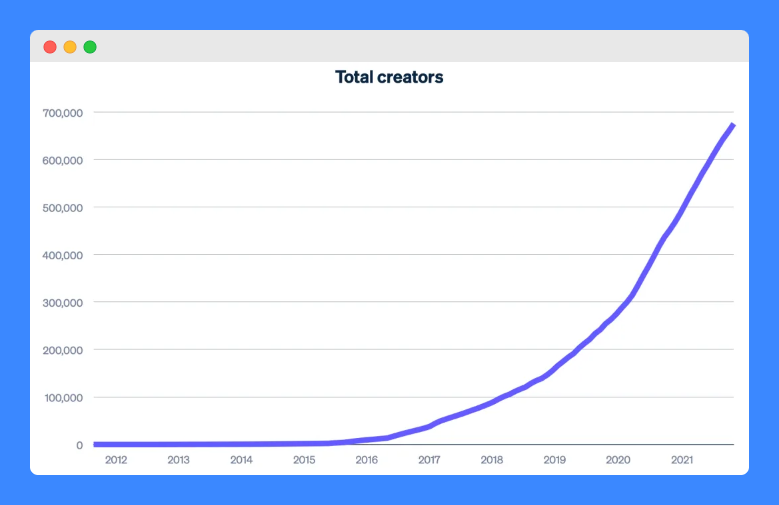
Original content creators like artists, writers, bloggers, song/video creators, etc. should all have one.
Are Copyright Disclaimers Legally Required?
No, copyright disclaimers are not legally required. Copyright is automatically granted upon the creation of an original work and exists whether or not a disclaimer is included.
However, by including a copyright disclaimer can serve your readers as a notice about your rights as the creator.
It may also be used to clarify the scope of permissions granted or denied for the use of the original content you’ve created.
When Do You Need a Copyright Disclaimer on Your Website?
You may need a copyright disclaimer on your website when you want to communicate the rights and permissions associated with the use of the content, clarify the scope of those rights, or provide information about the copyright owner’s policies.
These include the following situations:
- Displaying original content
- Allowing user-generated content
- Providing educational or informational material
- Offering downloads or resources
- Collaborating with multiple contributors
- Selling products or services
- Displaying third-party content
- Using copyrighted material under fair use
- Offering licensing or permissions information
- Seeking to prevent inadvertent infringement.
How Can Copyright Disclaimers Be Used To Express Your Fair Use?
While obtaining permission from the copyright holder is ideal, allowance is made for ‘fair use’ for purposes such as criticism, commentary, news reporting, teaching, scholarship, and research.
Basically, fair use allows for limited use of copyrighted material without the copyright holder’s permission.
The problem is, that determining whether your use falls under fair use can be complex. This is where copyright disclaimers come in.
Here’s how disclaimers can be used to express your fair use in two specific contexts:
Commentary and Criticism
When you create commentary or criticism about a work, using excerpts or elements of the original work can help support your points.
A well-crafted copyright disclaimer can acknowledge the copyrighted material and explicitly state your intention of using it for commentary or criticism.
You can say something like,
“This video includes copyrighted material from [copyright holder’s name]. The material is used for the purpose of commentary and criticism, which falls under the fair use doctrine of copyright law. No copyright infringement is intended.”
Parody
Parody is another common form of fair use. It involves creating a work that mimics the style or form of another work for comedic effect or social commentary.
When using copyrighted material for parody, a copyright disclaimer can help clarify your intent and prevent confusion with the original work.
Here’s an example of a copyright disclaimer for parody:
“This video is a parody of the work [original work’s title] by [copyright holder’s name]. It is intended as a humorous interpretation and does not intend to infringe on the original work’s copyright.”
Copyright Disclaimer Under Section 107 of the Copyright Act
Under Section 107 of the Copyright Law, limited use of copyrighted material is allowed without the permission of the copyright holder. This is known as fair use.
Fair use is not a free pass to use copyrighted content, however. Whether a particular use is considered fair use depends on several factors:
- The purpose and character of your use: Is it for commercial or non-profit purposes? Is it transformative?
- The nature of the copyrighted work: Is it published or unpublished? Is it creative or factual?
- The amount and substantiality of the portion used: How much of the copyrighted work are you using? Is it a significant portion?
- The effect of the use upon the potential market for or value of the copyrighted work: Will your use harm the market for the original work?
It’s important to remember that copyright infringement is a serious offense and can result in legal consequences.
If you are unsure whether you’re using someone else’s copyrighted material under fair use, it is always best to consult with a copyright lawyer.
What Are the Components of a Copyright Disclaimer?
A copyright disclaimer is a legal statement intended to specify the intellectual property rights and permissions associated with a creative work. But what exactly goes into a well-crafted disclaimer?
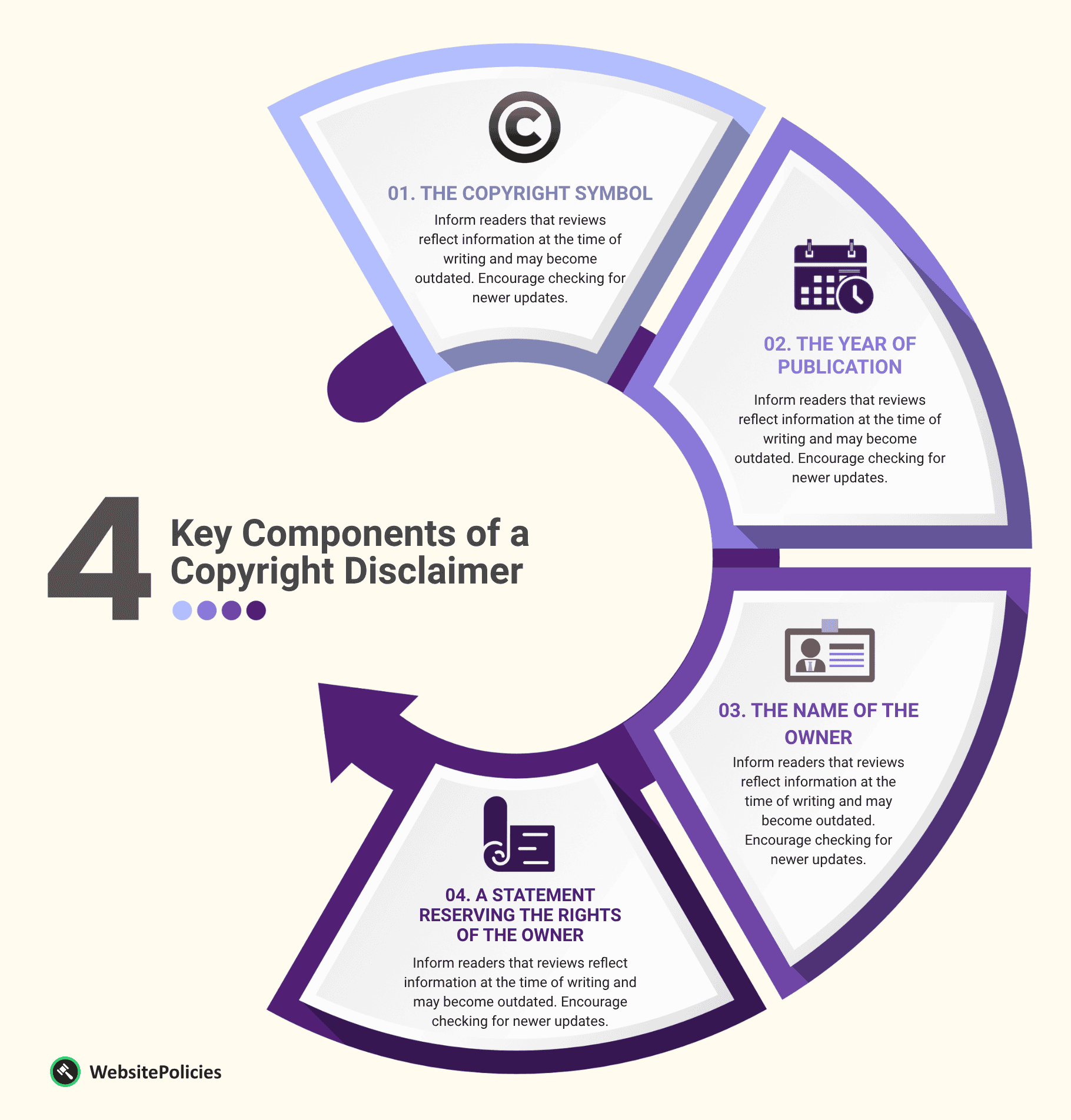
1. The Copyright Symbol
The copyright symbol (©) is used to indicate that a particular work is protected by copyright laws. Its presence informs others that the creator or copyright owner has exclusive rights to reproduce, distribute, and display the work.
As seen in the example below, Entrepreneur Media, LLC included both the © symbol and the word “copyright” in its disclaimer.

2. The Year of Publication
When you look at copyright disclaimers, you will also see the copyright date or the year of publication.
You add a copyright date to establish a timeline of when the work was created or made publicly available, which is relevant for determining the duration of copyright protection.
See the example below from houzz.com:
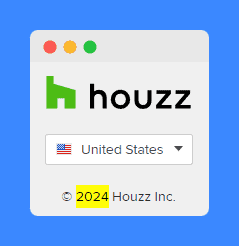
If you run a blog or website where you constantly add new content, you can include a copyright date range to cover all the years your content has been created.
This simple step, while not a legal requirement, is enough to protect your content in a legally enforceable way. Here’s an example of that from Glassdoor’s website:

3. The Name of the Owner
Clarity is key when it comes to ownership. Whether it’s the name of an individual or the name of the company, clearly stating the name of the copyright owner helps identify the individual or entity that holds the rights to the work.
This component ensures that people know who to contact for permissions or licensing. In the example below, anyone who wants permission to use content from the modern digital business publication International Business Times must contact IBTimes LLC.
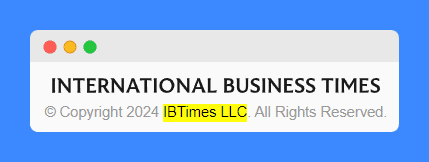
4. A Statement Reserving the Rights of the Owner
This statement emphasizes that any unauthorized use of your content may result in legal consequences. This includes the right to reproduce, distribute, modify, and adapt the material.
By incorporating these components into a copyright disclaimer, creators and copyright owners can ensure that people know what rights are reserved.
In the example below, Time USA’s “All Rights Reserved” disclaimer provides a clear framework for others wishing to obtain permission for specific uses.

Copyright Disclaimer Examples You Can Learn From
By studying standard copyright examples from established brands and organizations, you can gain valuable insights and create a disclaimer that is both informative and legally sound. Here are some free copyright samples to learn from:
Blog Copyright Disclaimer
In this example, the blog’s author clarifies that they retain all the rights to their artwork, regardless of whether they sell it as a commission.
No customers can come back in the future to claim that the author is stealing their images whenever the author re-uses an image previously commissioned by any customer.
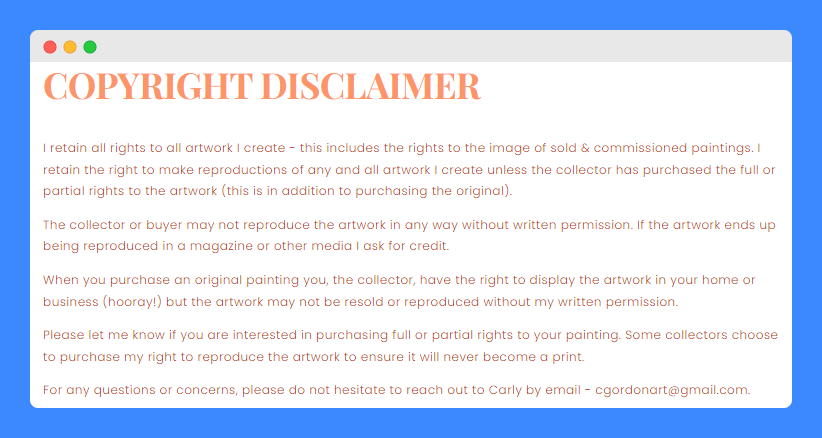
YouTube Copyright Disclaimer
Before posting content on YouTube, research the type of copyright laws your content falls under. Often, digital content creators use music or video clips from other authors.
Section 107 of the Copyright Act 1976 protects creators, allowing them to use copyrighted material as long as it’s for “fair use” purposes as evident below.
Here’s how this YouTube channel does it:

Facebook Copyright Disclaimer
To protect you from legal troubles, Facebook posts require you to only post your content, get permission from the owner, or only use material under fair use law.
For instance, here is Holy Tequila’s Fair Use Act disclaimer.
Adding this type of disclaimer qualifies your particular post as fair use. It shows the original copyright information, crediting the original owner.
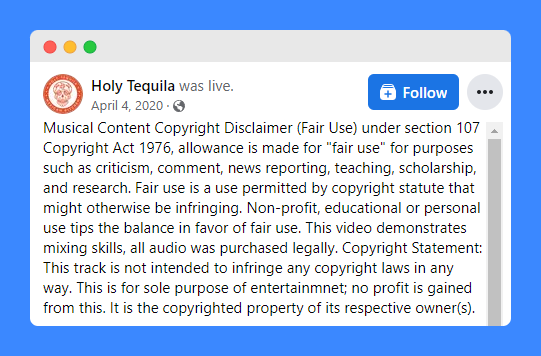
eCommerce Copyright Disclaimer
Check out Eagle Equipment Company’s copyright disclaimer. The clause prevents unauthorized copying, modification, reproduction, or transmission refraining users from tweaking the existing material and claiming it as their own.
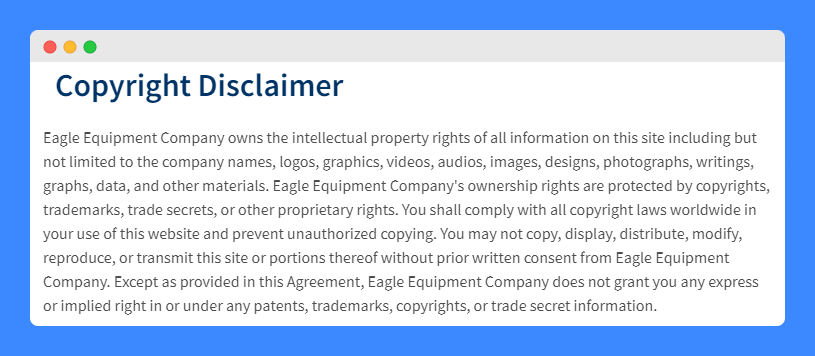
Web Development Copyright Disclaimer
Web developers can also create copyright disclaimers. In this example, the web developer reserves the right to limit who can use copyrighted material without permission from the owner. They reserve the right to provide permission through written consent.
On top of that, they state that individuals can link to parts of the website if they want to copy a particular quote or piece of information. The link can serve as crediting the owner of the site.
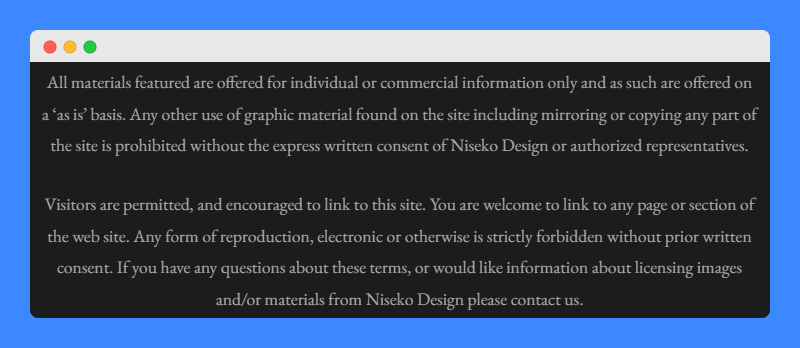
Marketing Agency Copyright Disclaimer
A marketing agency, Alter, allows individual, noncommercial reproduction of their content in their disclaimer. However, they limit the use of the content to only being in print or download format.
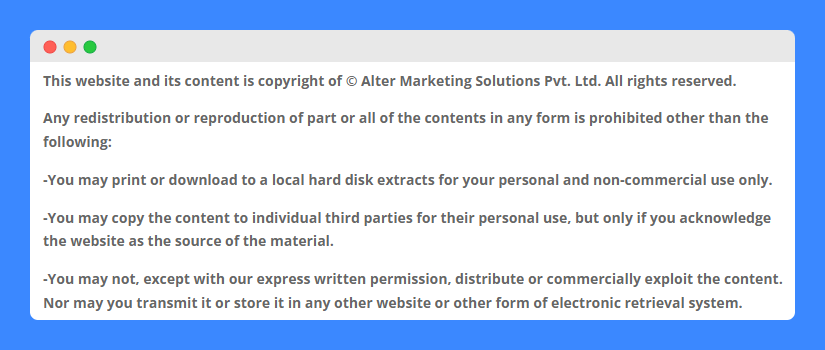
Where to Display Your Copyright Disclaimer?
To help ensure your rights are communicated effectively, put a copyright notice somewhere where it can be seen easily. Here are some strategic places to put it:
Website Footer
Putting a copyright notice at the bottom of every page is a common and effective practice. This ensures that visitors see the notice regardless of which page they are on, emphasizing the ownership of your work consistently.
You can see this type of copyright disclaimer website footer at the bottom of Fox News Channel’s homepage:

Email Footer
Extend your copyright protection to email communications by placing a copyright notice in the footer of your emails. This is a professional way to reinforce the ownership of your work in your digital correspondence.
Here’s how TED.com does it when they send out their newsletters:
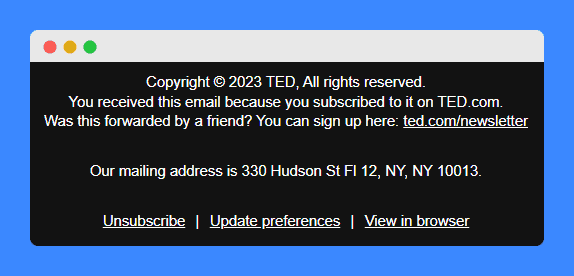
Mobile Apps
In mobile applications, consider displaying a copyright disclaimer in easily accessible sections such as the settings menu or the “About” section.
This reinforces your ownership of the app content and informs users about the copyright protections associated with it.
For example, in the video conferencing app Zoom, you will find the copyright notice when you tap on “More” at the bottom of the screen.
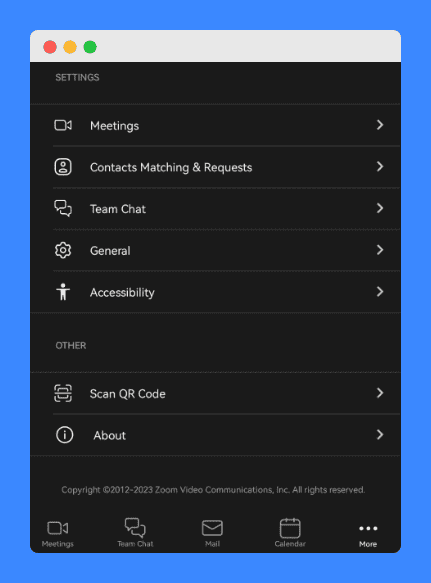
Downloadable Materials
Whether it’s an ebook, a whitepaper, or a template, downloadable materials deserve copyright protection.
Including a disclaimer within the file itself or on the download page clearly communicates your ownership and sets expectations for users.

Copyright Disclaimer Template
This copyright disclaimer sample template will help you write your copyright disclaimer. Don’t forget that it’s just an example and it’s a good idea to include other important topics within your disclaimer for the proper legal coverage.

Frequently Asked Questions
Can you copy and paste a copyright disclaimer?
No, you cannot copy and paste a copyright disclaimer. However, you can provide information about copyright laws and guidelines. This includes explaining the basics of copyright protection, fair use principles, and how they apply in different contexts.
Do copyright disclaimers work?
While it can’t completely stop someone from unlawfully republishing your content, it’s an effective deterrent and is sufficient in most cases.
What’s a fair use disclaimer?
It allows for the limited use of your copyrighted content without needing your permission. It typically applies to things like reporting, commentary, and criticism.
How do you give credit to a copyright owner?
It’s best to get permission from the creator first and then include the name of the person who created the work and link to it from wherever you used it.
What are the consequences if someone uses your copyrighted material without including a disclaimer?
If your copyrighted material is used without a disclaimer, consequences may include legal action, damages, or injunctions for infringement.



